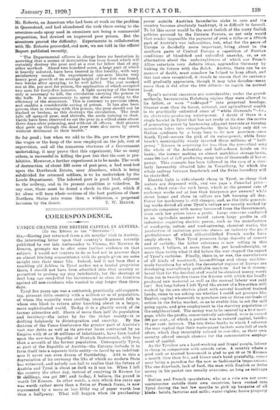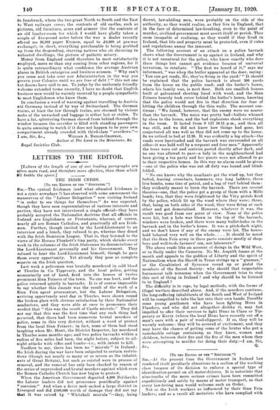CORRESPONDENCE.
UNIQUE CHANCES FOR BRITISH CAPITAL IN AUSTRIA.
- [To THE EIHTOR OF VIE " SPECTAT 01 L ."
Sia,—Having just returned from a six months' visit to Austria, the interesting letter upon that country's finances recently published by our late Ambassador to Vienna, Sir Maurice de Bunsen, prompts me to offer some further evidence on that subject. I would not venture to do so had not in pre-war days an almost life-long acquaintance with its people given use some insight into their inner life. Indeed, had it not been that a rambling old Schloss in Tyrol makes me a landed proprietor there, I should not have been admitted into that country or permitted to prolong my stay indefinitely, for the shortage of food long ago combelled the Government to close its frontiers against all non-residents who wanted to stay longer than three days.
Tyrol five years ago was a contented, practically self-support- ing, pleasant little country with a million or so of population, of whom the majority were sterling, unspoilt peasant folk to whom one liked to return after knocking about in a larger, more sophisticated world. To-day it is a ghastly wreck of its former attractive self. Shorn of more than half its population and territory—the tatter by far the richer moiety—it is drifting helplessly to disintegration and anarchy. By the decision of the Peace Conference the greater part of Austria's vast war debts as well as its pre-war loans contracted by an Empire with 40 or 50 millions of inhabitants, have been loaded upon the new-born Republic of Deutsch Oesterreich, with less than a seventh of the former population. Consequently Tyrol, as part of the Republic of Austria—the Entente forbade it to form itself into a separate little entity—is faced by an indebted- ness it never can even dream of liquidating. Add to this a depreciation of its currency the like of which no modern State has witnessed, and nobody can fail to realize that the future of Austria and Tyrol is about as dark as it can be. When I left the country the other day, instead of receiving 24 Kronen for 20 shillings, one got 5801 and to-day, I believe, the pound is worth 710 Kronen. In other words, a coin which five years ago was worth rather more than a Swiss or French franc, is now represented by a more or less filthy rag of paper worth less than a halfpenny. What will happen when its purchasing- power outside Austrian boundaries sinks to zero and the country becomes absolutely bankrupt, it is difficult to foretell. To let this occur would be the most foolish of the many foolish policies pursued by the Entente Powers, as not only would that render impossible the payment of even a tithe or a fiftieth part of Austria's war indemnities, but, what for the peace of Europe is decidedly more important, bring about in the southern parts of Central Europe a repetition of Russian conditions of bloodshed and unbridled anarchy, or, as an alternative about the undesirableness of which our French Allies entertain very definite ideas, aggrandize Germany by linking its future with the Reich. Austria, there can be no manner of doubt, must somehow be helped to keep afloat, anti this fact once recognized, it stands to reason that its currency will gradually appreciate, though it may take decades—many more than it did after the 1866 debdcle—to regain its normal level.
Tyrol's natural resources are considerable; under the grand- motherly, bureaucratic, Habsburg regime they were allowed to lie fallow, or were " recistaped " into perpetual bondage. Greater even than its forest, mineral, and agricultural wealth is its practically unlimited store of "white diamonds its electricity-producing water-power. I doubt if there is a single hamlet in Tyrol that has not ready at its door the means of generating power by harnessing adjacent torrents or turning mountain lakes into storage-basins. Quito lately only did an Italian syndicate by a large loan to its new province—once South Tyrol—secure the pick of its water-power, while Inns- bruck's municipality wisely invested three millions of "half- penny " Kronen in acquiring for less than the proverbial song the whole of the Achenlake and half-a-dozen hotels on its banks, the former making an almost matchless storage-basin, some 900 feet of fall producing many tens of thousands of horse- power. This example has been followed in the ease of a simi- larly favourably situated lake in Vorarlberg, by which the whole railway between Innsbruck and the Swiss boundary will be electrified.
Electric light is ridiculously cheap in Tyrol, so cheap that meters are dispensed with, and one pays a l'ausehol price— viz., a fixed rate—for each lamp, which at the present rate of exchange works out at less than fourpenee per annum/ whila street lamps and those in cellars are left burning all day. Power for machinery is still cheaper, and, as the little generat- ing works dotted all over Tyrol's valleys are usually worked by private companies with money borrowed from the Government, even such low prices leave a profit. Large concerns conducted in an up-to-date manner would return large profits in all industries requiring electric power, such as the manufacture of wood-pulp, cotton- and wool-spinning, chemical works, the production of imitation precious stones, an industry the greet profitableness of which old-established French works have amply shown. Then Tyrol possesses large deposits of cement and of carbide; the latter substance is now selling in this country, I believe, at more than 30s. per hundredweight, or more than treble what it did before the war stopped the export of Tyrol's carbides. Finally, there is, or was, the manufacture of all kinds of woodwork, house-fittings and cheap machine- made furniture for which the devastated regions of Europe are developing marvellously profitable markets. And be it remem- bered that for the finished stuff would be obtained money worth from ton to twenty-five times the Kronen with which the locally produced raw material as well as the manual labour was paid for ! Not long ibefore I left Tyrol the owner of a fine cotton mill worked by its own electric plant with several hundred trained hands, came to me asking me whether I could not procure him English capital wherewith to purchase two or three car-loads of cotton in the Swiss market, so as to enable him to set the mill going again, and give employment to the starving population of the neighbourhood. The money was to be secured by a first mort- gage, while the profits, conservatively calculated, were to exceed 300 per cent., of which a portion was to reward capital, besides 10 per cent. interest. The two Swiss banks to which I referren the man replied that their waste-paper baskets were full of such offers, which they invariably refused to consider, as their own country offered enough chances for the remunerative employ- ment of capital.
As the Tyrolese are a hard-working and frugal people, labour is cheap in comparison with outside rates. A country where a good cook or trained housemaid is glad to get 60 or 70 Kronen a month (less than 3s.), and kisses one's hand gratefully, comes near being a paradise for the now so fashionable impecunious. The One drawback, lack of food, the man with English or Swiss money in his pocket can usually overcome, as long as railways run.
Italian and French speculators, who as a rule are not over- venturesome outside their own countries, have rushed into Tyrol during the last few months to pick up bargains of all kinds: hotels, factories and mills; water-rights; house property
in Innsbruck, where the two great North to South and the East to West railways cross; the contents of old castles, such as pictures, old furniture, arms and armour (for the contents of an old lumber-room for which I would have gladly taken a couple of five-pound notes before the war a dealer recently offered me 96,000 paper Kronen, equal to £4,000 at pre-war exchange); in short, everything purchasable is being grabbed tip from the desponding, starving natives who sit shivering in unheated dwellings, the picture of pathetic misery.
Money from England could therefore be most satisfactorily employed, more so than any coming from other regions, for it is quite extraordinary what confidence the average Austrian places in British enterprise and business acumen. " Why can't you come and take over our Administration in the way you govern your Colonies until we are free of debt ? " this not one but dozens have said to me. To judge by the uniformly friendly welcome extended totme recently, I have no doubt that Engli.sh business men would be warmly received by a people sympathetic to most Englishmen who know them.
In conclusion a word of warning against travelling to Austria rid Germany instead of by way of Switzerland. The German trains, at least the few through trains, are stormed by vicious mobs of the unwashed and luggage is either lost or stolen. To have a fat, spluttering German shoved from behind through the window because the corridor is filled with standing passengers Is quite amusing to watch if it does not happen to be your own compartment already crowded with third-class " overflows."—
I am, Sir, &e., WILLIAM A. BAILLIE-GROHMAN, Author of The Land in the Mountains, &c. Royal Societies Club.



































 Previous page
Previous page